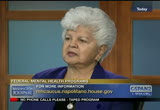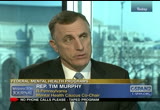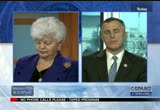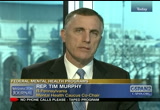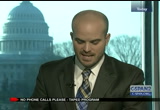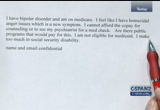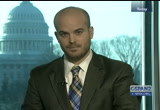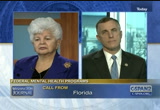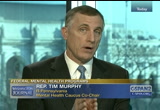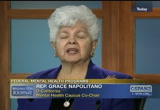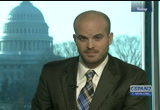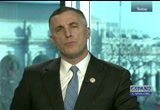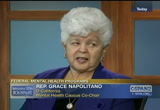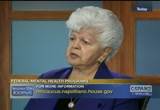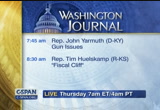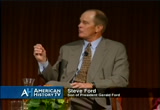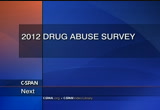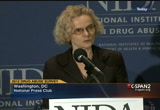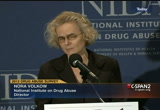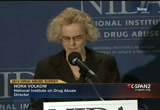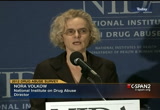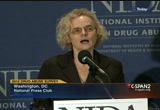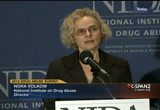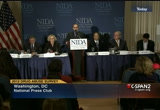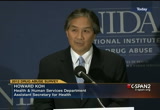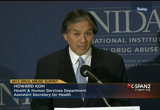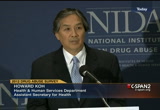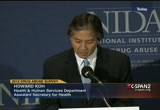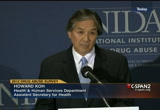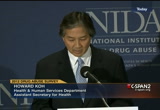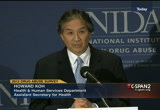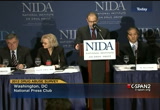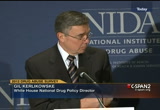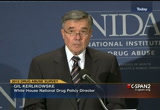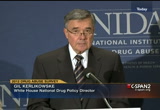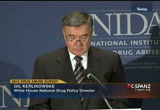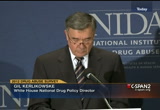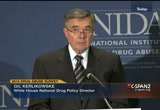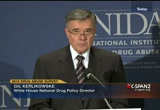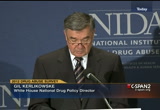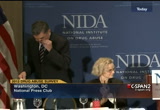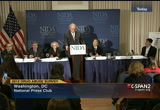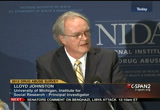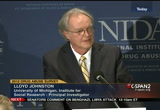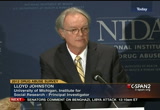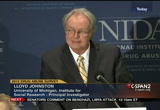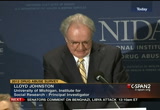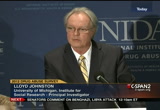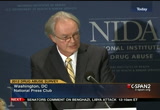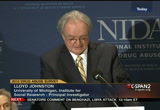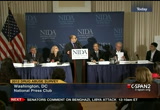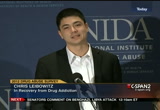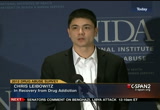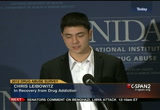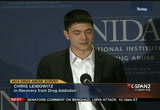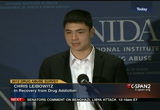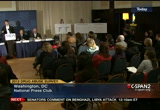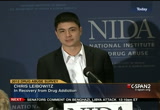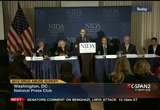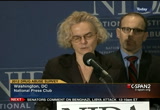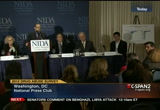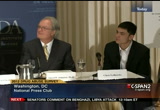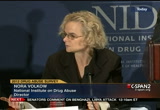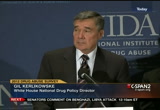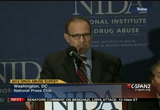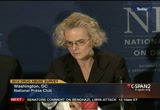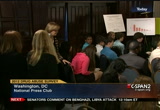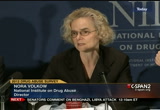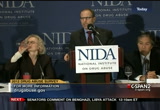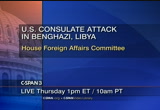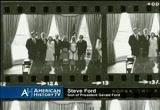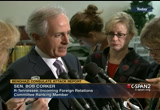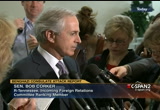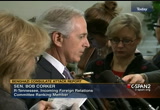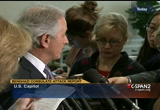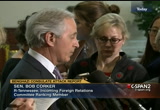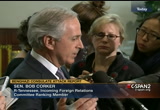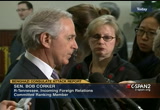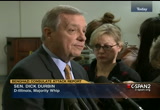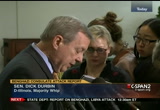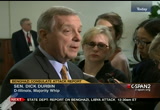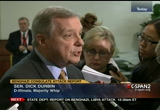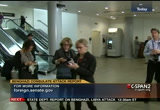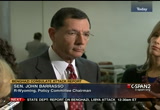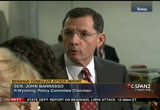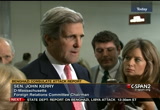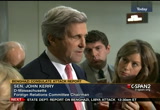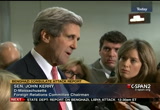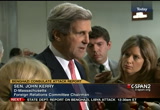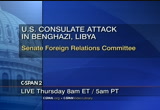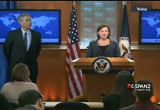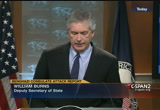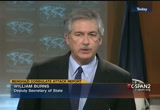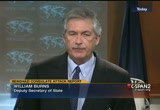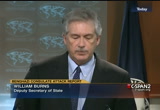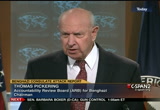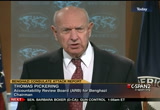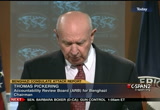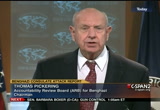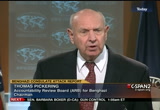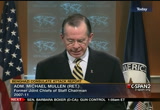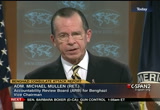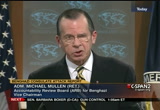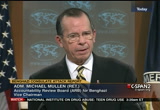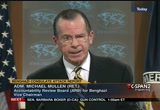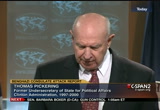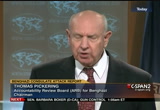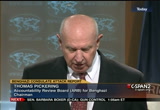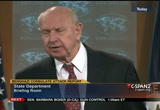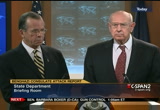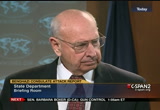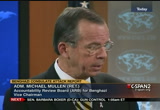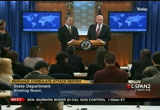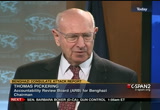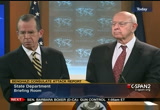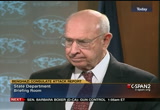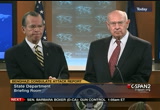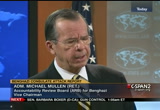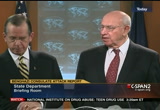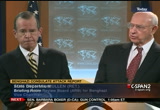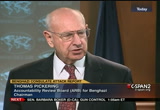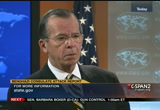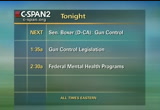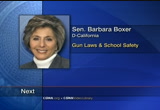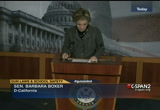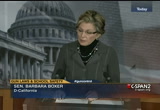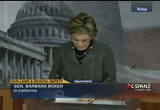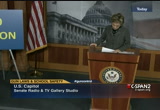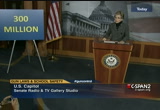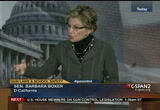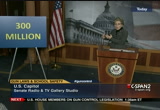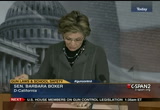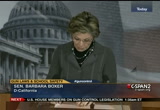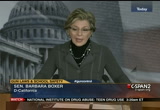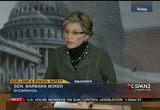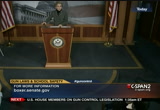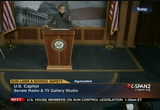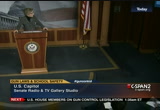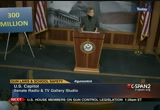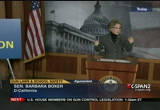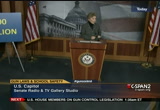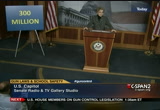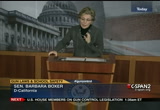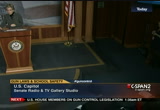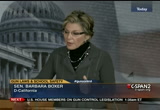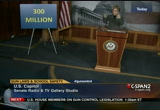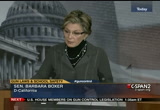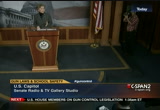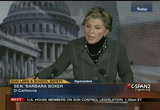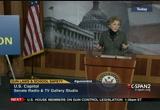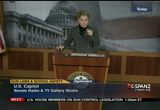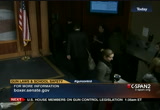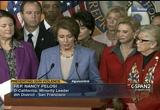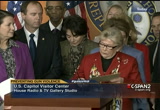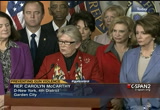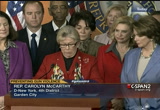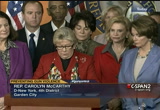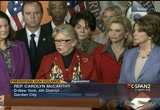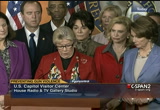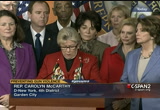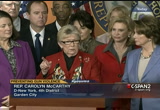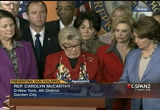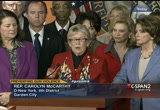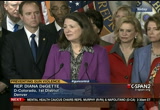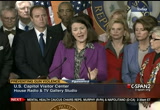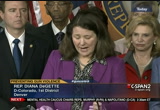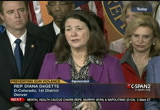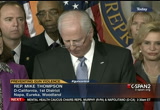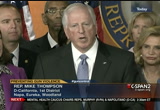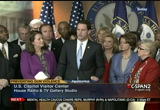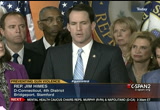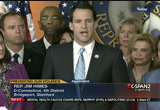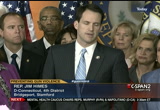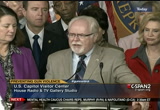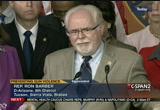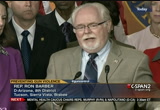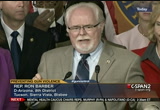tv Capital News Today CSPAN December 19, 2012 11:00pm-2:00am EST
11:00 pm
when tim came on, i asked him to join me. because we needed a republican in democrat to balance it out so we can get both sides involved. the idea is to be able to raise awareness. reduce the stigma. bring information not only to members the members of congress, but to the staff. we are helping the members, guiding them into areas where there is more dialogue. >> guest: i would suggest members talk about government funding being effective and we have the right program. if not, ask congress to take the right steps to make sure it takes place where it's needed. i know a lot of americans are deeply concerned. and we all want to help and make sure that we do everything we can to prevent this from happening again. there are two things you can do.
11:01 pm
>> guest: many democrats, very few republicans. >> host: we have another caller from ohio. >> caller: good morning my younger brother grow up without video games. we had a stall -- solid christian family. he is schizophrenic, i'm a few years older than him. we had paid for services and help. there is no way he contributed to the society. he cannot work. he is totally medicated, excuse me. i respectfully disagree with the republican congressman who says with accounting we can do a better job. [talking over each other] >> caller: excuse me, and what we can do is tell her parents do a better job. there were no video games when my brother was growing up.
11:02 pm
[talking over each other] >> guest: i said many times these problems to emerge. i named a host of things that can be done. there have been a couple of shootings in my own district. one of them by a gentleman who was diagnosed with different. in another who had psychological problems. i'm not blaming this on the parents. i'm staying with these situations, you do have mental illness that emerges. the issue is getting them help. here is what happens in society. in a move to shut down all the institutions and hospitals, look, i understand that we don't have those for the misbegotten. they were treated that way. there are many people out there who said they cannot function in society and we need alternatives for them. we cannot over medicate them into a stupor. that is wrong. they need alternatives. we also need to understand that
11:03 pm
medication can be helpful. but what we have done -- the only thing we offer parents and i have had situations like this, and the article you read about adam lanza's mother. many times, they say we will get a child in a juvenile detention facility. those are mental health treatment. and they never will be. but we are now turning those where people can have ongoing treatment and help. please understand, i will never say another advocate this in the wrong way. >> host: the number of state psychiatric hospitals closed -- i'm sorry, 15 state hospitals closed, 4471 beds. this is between 2009 and 2012,
11:04 pm
at a time a lot of people were affected by the economy, and perhaps seeking the services. >> guest: the majority of people there need psychiatric care. there are so many better just institutionalized without any assistance. they come out and they get no services. >> host: an e-mail came out this morning. it was kept confidential. i have bipolar disorder, and i'm on medicare. i have anger issues, and i cannot afford the co-pay for counseling or to see my psychiatrist for a medical checkup. other public programs that would pay for this? i am not eligible for medicaid. i make too much in social security disability. congresman griffin. >> you have to call your
11:05 pm
psychiatrist anyways. you can also go to the emergency room. the emergency room is required to do if you come in. he talked to the doctors there, ask to see a psychiatrist there. i have concerns right now. it is extremely important. you cannot let that go. go to the emergency room and talk to people there. same thing goes for people who are suicidal. >> host: we have the number for the suicide prevention lifeline hotline there. we want to go now to shirley from palm beach florida. surely come thanks for joining us on the "washington journal". >> caller: good morning. i worked in mental health services around 20 years after it raised my family and myself. twenty years of that was then
11:06 pm
ejected. in the hospitals. i suffer from depression. and i found that i have allergies. there is a book and he talks about how allergies can affect us so severely that it can cause things like depression, retardation, epilepsy and many physical ailments as well. hypertension and hyperglycemia and etc. and it is hard and people look at me like i'm crazy. and i say, look at your diet. many people believe that schizophrenia can be cured by diet?
11:07 pm
>> host: congressman? >> guest: there are a lot of things that go into this. you people have food reactions and supplements that can affect them? yes. as a cause of schizophrenia, i don't know. i don't want people to think that if only i change my diet, it will go away. there are a lot of other issues there. there are genetic issues, environmental issues, many other aspects here. working with this for 35 years, working in the navy reserve as a psychologist, it isn't just the aspect of food. it's important to stay physically fit and not be isolated. those are our part that help us overcome these aspects. and we know what a person with a sedentary lifestyle deals with. a lot of those things can impact of brain development.
11:08 pm
especially the not sleeping correctly, the number of hormonal levels in the brain can also worsen mental illness. if you see a doctor and look at diet and exercise, food intake, history, symptoms -- all of those are apart. what we don't want to do is say here, coming a few months. that's the role of treatment. the combination of therapy, much as needed and looking at all parts of it are very important. >> guest: raising children by yourself, congratulations. i felt very depressed because my husband is not necessarily the best parent my children. i was the disciplinarian. but certainly a good diet will help address some of the issues. yes, there are clinical aspects
11:09 pm
as well. generally if you have a good diet and eat well and eat the right foods, you won't have a ton of impairments in dealing with these issues. while it isn't the answer, it is one of the upstart looking at. >> guest: how we are managing these things, about one in four people have a diagnose diagnosis of a mental or emotional condition. things that are very easy to treat. >> host: we have another guest on the line. >> caller: thank you for taking my call. something that hasn't been discussed is about medication and antidepressants. the problem is that can be
11:10 pm
caused, i've been depressed probably since i was a teenager, but was never medicated. in 2000, i developed chronic pain and became pretty hard to deal with. of course, you know, i was upset, i would cry a lot. my doctor said, oh, you are depressed, and they put me on prozac. then my doctor put me on another drug. within two weeks, i developed a panic attack that enough to be put in the hospital. in there, you know, i said to the doctor, i said i've been put on these drugs, cannot be the problem? and they said oh, no. they're treatment for me is to put me in a room and call me crazy. >> guest: can i ask you a question from and i'm not trying to treat you. the physician to prescribe it, is that a psychiatrist? >> caller: it was my pre-medicare doctor. >> guest: i won't do [inaudible]
11:11 pm
i understand what the doctors trying to do when someone has chronic pain and it can lead to serious problems here. your brain and your system is getting overwhelmed. but at the level where you're having concerns, it is important to get the right mental health treatment. you need to see a psychiatrist. with regard to psychotherapy, been put in a room and told you need to get over that, you need to see someone who is trained in this aspect. >> if you look at all the ads selling these products, we are looking at some of the possible side effects. anyone who takes any kind of medication, ensuring that they know what they're doing.
11:12 pm
>> guest: they take a medication, another medication for side effects, and it goes on and on until they take several drugs everyday. people become reliant on them, and then you stop taking them, if you smoke and take them, drink alcohol or take them. it can cause a lot of issues. >> host: i want to get each of you on how you keep these issues in the minds of your colleagues. not just in the days after newtown, connecticut, but in the days and weeks coming. >> guest: hopefully we can get together and work on the administration and we will find out what it will do in bringing all these agencies together to find out how can we work at this level to begin to help people and the funding that is necessary and will be effectively utilized at the local level. we can talk and put all kinds of care at the local level.
11:13 pm
being able to have enough information -- providing more education to people in congress. >> guest: we need to continue this dialogue with members of congress. we would like to meet with the president and discuss these issues and have an important national form as what congress can do as well to smack congressman murphy and congresswoman napolitano, thank you so much for being with us two on "washington journal" tomorrow morning, focus on gun control issues. tim huelskamp will join us to talk about the latest on negotiations on the so-called fiscal cliff. he was one of four gop members of two committees. they said it was retribution for their voting records. and they look at what options
11:14 pm
the administration has to tighten gun-control laws. with or without congressional action. our guest will be david ingram, the justice department correspondent for reuters. "washington journal" is live on c-span everyday at 7:00 a.m. eastern. >> her first experience was to come in at different ways than every other family here. it is interesting because after dad was sworn in, we went and@p@ took a picture photo of the family behind the oval office desk. that night, we didn't get to move into the white house. nixon had left so quickly and unexpectedly, they left their daughter and son-in-law to pack all of their clothes and belongings. it literally took seven or eight days. we had to go back to our little house in alexandria, virginia, suburbia, the neighborhood we were surrounded with the secret
11:15 pm
service. and i will never forget that night mom was cooking dinner. literally we are, you know, sitting around the dinner table or a mom is cooking dinner, and she looked over at my dad and said, jerry, something is wrong here. [laughter] she said you just became resident of the united states, and i'm still cooking. [laughter] growing up in white house on sunday evening at 730 eastern and pacific. it is part of four days of american history tv right through christmas day on c-span3. >> the latest survey on drug abuse shows that drinking and smoking was down among high school students in 2012. the marijuana use remains high. also, the use of adderall, a drug used to treat add was also
11:16 pm
a concern. this briefing is 50 minutes. >> good morning, i would like to welcome everyone here. i would like to thank you for being here. every year, we meet together to talk about drug use in our country among high school students. also, about perception. it is through this that we can guide our way of prevention and also evaluate how effective drug use prevention measures have been. we have indicators that are changing, those that are not changing, and those from the other side. i think that we need to pay attention in order to be able to continue to relate. over the past five years, we
11:17 pm
have seen an increase of use of high school students. we have significantly higher levels of daily use of marijuana. according to the survey, 6.5% are using marijuana daily. yet only 44% perceive daily use is risky. it is this very low perception of regularly use of marijuana is coupled with these increases. we have seen throughout surveys done in health care system, a significant increase in the number of treatment admissions for marijuana abuse, which has increased significantly, as well as increases in emissions for emergency medicine department. clearly, there is a misuse of
11:18 pm
marijuana. another indicator that is worrisome is that of synthetic natures, already abused by 11% in the last year, which is an extremely high number if you think about it. figuring then you have on one side marijuana increases and on the other, we actually recognize that we are going into an era where [inaudible] i always get asked the question about why worry about marijuana since alcohol is more worrisome. my perspective is that it's not necessary.
11:19 pm
this can have profound and adverse consequences. my question has always been that the more you make the drug available, the number of people that will be exposed to this, and we know from surveys that this perception is actually one of the factors. we also know that the use of marijuana is actually impairing the function of the human brain with respect to the indicators are actually going in the right direction, many of these things are actually decreasing. this is very good news. alcohol and nicotine continue to go down among teenagers. this is the lowest that the prevalence rate has been since the inception of these
11:20 pm
measurements. as of now we know that alcohol and nicotine cause a great deal of mortality rates but also identifies success of prevention efforts because of the very aggressive prevention. respect to indicators that are still worrisome, we are seeing prescription medication abuse up throughout the country. the patterns relate to vicodin and other drugs, which have gone down since the high numbers of 10%.
11:21 pm
those folks are made stable at 4.5% for the past year. we are seeing an increase in the use of other medications, which are used for attention deficit disorder and adderall, and it's also been used as a means to improve cognitive performance and we see significant increases since 2009. 7.6% of 12th graders have used these for other medical purposes. what do these numbers tell us? i think they identify the areas where we need to pay attention and not become complacent. there regardless of our perception and we do recognize
11:22 pm
that regardless of of this potential, the worse the outcomes. we need to ask if we want to be facing this abuse that we are dealing with. we want to do prevention can avoid this and the consequences. thank you very much. [applause] >> thank you, doctor. until the mention that doctor nora volkow has been the director of national drug abuse since 2003 and has literally led the effort to ensure that drug addiction is viewed as a chronic brain condition. we really do appreciate the leadership that doctor nora volkow has taken in that respect. the next speaker is doctor howard koh. he served as the assistant
11:23 pm
secretary of health for the u.s. department of health and human services after being nominated by the senate in 2009. he oversees a number of officers, including the office of the surgeon general and serves as a senior public health advisor to the secretary of health and human services. with that, doctor howard koh. [applause] >> thank you very much, doctor stein, for inviting me to this very important conference. i would like to express my gratitude to you and doctor nora volkow for her leadership. thank you all so much for being leaders in this very important part of public health. a special thanks to doctor johnson. it is a great pleasure for me to be here for in examining the results being unveiled today, we should remember that of all these agents, the tobacco
11:24 pm
remains the leading cause of premature and preventable death in the united states. smoking kills more than 1200 americans every day. for every tobacco related death, there are two new replacement cigarette smokers under the age of 26. it is tragic these replacement smokers are kids who start when they are not fully ready to make an informed choice. indeed, you have heard that tobacco use is a pediatric disease. three out of four teenagers who smoke continued to smoke into adulthood, even though they intend to quit. a typical smoker loses to their lifespan being shortened, 13 or 14 years. cigarette use is dropping, and that is a very positive news, but it still means that one in five high school seniors,
11:25 pm
specifically 71%, are still using cigarettes in the past month. we should remember that kids are not just replacement cigarette users. they also use an array of other deadly tobacco products as well. the industry continues to create many tobacco products that we find appealing. some cigarette sized cigars include fruit flavoring like strawberry and grape. furthermore, kids now have access to the latest smokeless tobacco products, which dissolve like men's. so these are appealing to young people. in part because they can be used at school or at home in front of mom and dad and not be detected. unfortunately, these products, too, cause nicotine addiction
11:26 pm
and can cause death. the data being announced today suggesting considerable amount of other tobacco products. more than a quarter of 12th grade males, 27.1%, using small cigars. furthermore, use of other tobacco products like hookah, is also high. 18.2% of high school seniors reported using this in the past year. in summary, while the decline in cigarette use is encouraging, we must do more overall to help children to be tobacco free. significant use of other tobacco products threatens to offset the gains made in the declines of cigarette use today. so what should we do? we know works. supporting comprehensive tobacco
11:27 pm
free and other tobacco control policies, fully supporting implementation of the 2009 family smoking prevention and tobacco control act. extending use of the tobacco cessation services and using media to encourage people, especially young kids to live tobacco free. last month the department of health and human services unveiled be tobacco free.god. please visit it. also, we are very pleased to announce an award of nine contracts for five years to develop a sustainable public-health campaign to address the public-health problem of tobacco use in children and kids. we are looking forward to coming back to you in the future to tell you how this campaign will be unveiled, how it will be a
11:28 pm
message of prevention and how it will be launched. overall, this survey is so valuable. it reports usage rates not just for tobacco, but all of the drugs and alcohol as well. we put it all together, some 40% of 10th graders and about half of 12th graders using at least one, if not several of these substances. again, we must work together promote prevention and work with kids and parents. to enforce alcohol control policies, create environments that empower young people not to drink, use drugs, or use tobacco. identify alcohol and other drug abuse disorders early and provide referral and treatment and reduce inappropriate access
11:30 pm
[applause] >> thank you, dr. koh. either the unique mind to enter its last couple of years at a number of initiatives and currently of course working with dr. woolcock than previously having the opportunity to work with our next speaker, was mr. gill by president obama affirmed by the u.s. senate as the direct her of drug control policy in the white house. in this position coordinates all aspects of federal drug programs and implementation of the president's national drug control strategy. he brings 37 years of him for his manager policy experience and most recently served as chief of police for seattle
11:31 pm
washington where he last ran at its lowest point in 40 years. [applause] >> well, good morning and thank you very much for being here. this is a wonderful opportunity for me to associate again the future report with dr. walkoff and the staff that supports dr. johnson in the work he has done. the assistant secretary of health, dr. koh could not be a stronger partner on these issues in his words about the health of young people and responsibility we have as adults they think are particularly important. i'm looking forward to hearing from you and it's always a great pleasure to be with dr. johnson who has given us the information that helps so much and not only
11:32 pm
making policy, but also the information needed to improve the nation's health, particularly the health of young people. so there's a couple of important things that i really took from this report. but to put it a little bit into context, remembering this is the snapshot of the prior year and it's also helpful to think about where we than in the drug abuse and the turf field for the last number of decades, actually over the last three decades. so as the draft policy, it's very helpful to take a look at that. we've actually made strides forward in reducing in america, despite some of the increases over the past several years. over the long-term, the rates of drug use among young people today are far lower than they were 30 years ago. we have to continue a downward trend that may have to work on that very hard and we have some
11:33 pm
troubling signs as dr. volkow mentioned. we have to educate people, young people about the risks associated drug use and just as we actually educated people about the harms of tobacco in the dangers of alcohol and impaired driving, that information needs to be communicated, not in a threatening way and not in a scare tactic way companies to be communicated in a directory that parents and others, other adult influences as we like to call them that can provide that kind of leadership. as the president has noted, we successfully changed attitudes regarding and alcohol impaired driving and we very much can be the same when it comes to drugs. we recognize the impact drug use has on this country into minneapolis have been touched by an overdose. features that have been significantly reduced or
11:34 pm
impacted by substance abuse dependence. unfortunately, drugs hold back too many americans from looking up to the things they want to achieve in their lives. in today's findings give us insights, information used to develop these evidence-based policies. not the policies of ideology and not the policies of which way the wind happened to be going on this issue, but the evidence and research and data needed to make the change. young people represented in today's studies are making decisions that are really going to define their future in the future of this country and the health of the next generation of americans leaders and citizens is critically important to all of us. they deserve the strength and support from us to make those healthy decisions and to choose a life that isn't hindered by drug use. that's why the monitoring the future survey is so important
11:35 pm
and can access to their experiences and thanks to the work that's gone by the survey we have the information we need. the obama administration is focused on one area dr. volkov mention prescription drug abuse. this is monitoring the future result show that were concealed in positive outcomes including a decrease in the past month use of pain relievers by high school seniors to continue to help prevent the abuse of prescription drugs, we've really encouraged americans to keep track of the prescription medications in their home and to dispose of those unused or unneeded medications properly. we have a lot of information on their websites that are very helpful to you and them. i think the message that dr. koh on the tobacco and underage drinking issues are helpful for young people.
11:36 pm
the illicit drug survey contains some disconcerting thing. marijuana use among teens remains unacceptable levels and increased in all three grade levels mentioned in recent years. as another troubling point over the last several years the perception of harm and perception of risk around the use of marijuana has declined in the percentage of high school seniors who smoke marijuana regularly is harmful is lower than it has ever been since the 1970s and historically listed in the perception not only leads to increased use, but we certainly have seen that in the surveys. in fact, more students now report smoking marijuana during the past month than i do smoking cigarettes. often users are uninformed and frankly naïve about dangers posed by substances. substances such as k2, from
11:37 pm
headache receiving the thought of media attention and were brought to real awareness to the results from two years ago. i was particularly helpful. we will see decreases in the use of these synthetic drugs, that the sharply numbers in the survey particularly show young people contend to turn to those also. the most of the one-time use of 12th graders reported synthetic cannabinoids is really alarmingly high and despite of course the psychotic effects in the articles you've read about the results of some of these and makes it difficult for parents and influencers to communicate the dangers of substance abuse
11:38 pm
and we have to redouble our efforts to prevent more needless harm associated with it. in recent years, we've seen an increase in the use of the stimulant adderall among high school seniors, which had been accompanied by a decrease in the perception of risk associated with that and the availability of adderall on college campuses having gone up, we have to carefully examine how young people are obtaining those strokes. that brings me to my final point while we're re-examining how young people obtain adderall and educating them about the dangers of the synthetic cannabinoids, showing them how marijuana use harms the developing brain or empowering them to the tree of tobacco and alcohol. the parents and their teachers and coaches and mentors and others can have an incredibly positive effect on young people's lives and prevention is the very pedestal that we have. our national media campaign is called about the influence. we've been amazed to see about 2 million young people and make
11:39 pm
it their own through their own interpretation of art and poetry and music and those are powerful statements only hope you take a look at that. you have the creativity of being healthy and making positive choices in their lives and refuting the prodrug messages that can so overwhelm them. we continue to support to the website about the influences that the media campaign appeared with akamai will turn turn this back over to dr. stein and thank you love very much. [applause] >> thank you, director kerlikowske. i next is dr. lloyd johnston,
11:40 pm
whose the distinguished research scientist at university of michigan institute for social research and principal investigator of the monitoring since its inception in 1975, which is an amazing he's provided them the trend uses the money for our country. and many national international bodies in a wide variety of issues including of course alcohol and various illicit drugs. alter the podium over to dr. johnston. [applause] >> please so many are so many of you turned out. it's a pleasure to again announce results from this study journey direct your kerlikowske, assistant secretary >> translator:
11:41 pm
koh and the/year hopefully next. despite others whose we actually get younger. each time we do a survey. a special orange and a very spirit i'm going to start a focus on some of the highlights that are most interesting and most important they fear one of those has to tell bath salts. here at a lot of the press about that salt and how dangerous they can be and i think i believe that. but i don't believe there's been any very good empirical evidence of how expensive their uses and for the first time this year, we had it in the survey in which i fortunately the groups are very low levels of use a little over 1% in the past year and 12th graders, less than 1% of the
11:42 pm
10th graders. now that's a good news. it could be working in on a late downturn because according to the national poison control centers, their reports about software that dramatically in 2010, but have been declining since and still declining. i think maybe with happening here is first of all the fda has scheduled some of the ingredients used in these over-the-counter drugs, which by the way has nothing to do with salts. this just a term that's used to make them look legitimate. in addition, media coverage has but one 10th, but a lot of kids have gotten the message. the main point is for low-level compared to what we might have had. as you've heard, synthetic marijuana is not true. this isn't synthetic that really
11:43 pm
made inroads. it's the second most widely used drug amongst eight and 10th graders centered among 12th graders after marijuana in every case and after inhalants among the graders. and today we have 11.3% of the seniors are one in every nine indicating the these synthetic marijuana, which they buy in various head shops or novelty stores of various kinds. in just the past year. that's the disturbing what's more disturbing is that it hasn't gone down. since that week where it was last year. despite the fact that dea schedule a number of drugs, which were used in the substances. marijuana of course remains the most widely used up all the drugs. that hasn't changed for many years. but after rising for four years, it leveled off this year i perhaps an unacceptable level,
11:44 pm
but it has at least leveled off. daily marijuana use has maintained a high level, probably the highest in the last 30 years that we've seen, with 6.5% of high school seniors say they smoke ideally in just the past month and that's about one of every 15 seniors. so if you look in any class of 30 kids, two of them are heavy pot smokers on average. given the increasing information about the consequences of that, including dependent, including brain damage, including the effect on i.q., that is really a concern i think. very positive development this year for sure, xtc is down, saudia is found significantly. inhalants are down and taken without using a needle is also down. that was the former heroin use
11:45 pm
that burgeoned in the 90s and has a lot of users to about what people using with needles. other narcotic drugs, as you've heard, specifically oxycontin and vicodin were down significantly this year, to if we look at the three grades combined. the proportion of kids using prescription drugs of any kind has leveled for several years. it's about 15% of high school seniors say they've used one of the rx drugs without medical supervision in the prior year like amphetamines or sedatives or tranquilizers or narcotic. most remaining drugs either held steady or showed nonsignificant declines this year. many are well below levels they have been at until they founded
11:46 pm
10 years ago. it included some important ones like and crack, methamphetamine, crystal methamphetamine, lsd and steroids. now you've heard a couple of the illicit drugs, cigarette smoking continues his long-term decline is really quite a dramatic decline over the last 15 years and it is again this year from the average price three grades from 11.7% who used in the past 30 days to 10.6. that is specifically significant. it's about a 9% drop in the number of kids who were smoking and i can't really begin to tell you what that's going to mean for the long-term health and longevity of these youngsters. this dr. koh has eluded. something else i found this here
11:47 pm
speaking with dr. koh is other forms of tobacco disease particularly concerned about smokeless tobacco in general has declined, but the other forms like hookah and dissolvable tobacco all-state level this year. i think in a way that's good news. we would like to see them down. and alcohol, it's really at the lowest level we've seen in the life of the study, as their cigarettes. that is pretty dramatic change as acculturated behavior of alcohol consumption is in the sculpture, the eighth year, the only continued down to the levels among the 10th and 12th graders showed a slight uptick, especially binge drinking or 22% or 24%, just in the past two weeks they've had five or more in a row at least
11:48 pm
once. alcohol availability to eighth-graders did continue to decline as the tobacco availability. so i think some policy efforts out there probably at the local and state levels are having an effect in cutting down access to these drugs for young people. so the federal raise marijuana use level of daily use of unacceptably high levels. synthetic marijuana use also has leveled, but remained at a high rate among 12th graders. cigarette smoking is declining in an historically low level. alcohol use is declining, but it's up below to 12th grade and a number of these illicit drugs, including some very important ones are declining. finally, as i started, that salt have not made a very serious and
11:49 pm
wrote at this point and that's encouraging. thank you. [applause] >> thank you dr. johnston. we thought it would be important to ground us by the findings of the survey and that really is our future generations and we came upon our next speaker, mr. chris liebowitz at a town forum in arlington that we invited chris to come in about his experiences to get his in the future prevention efforts. [applause] >> hi. thanks for having me appear.
11:50 pm
i don't necessarily feel qualified to stand up here with you guys, but what are you going to do, i am here. i've never done bath salts. i was thinking about that, but i know for me when i was using drugs, i probably would've used that sells it was available it is i guess i'll take it. whatever was laid out in front of me started with using marijuana because a couple of the guys were talking about alcohol and marijuana, alcohol and cigarettes were really available when i was 13 and when you're 13 it's hard to have a fake i.d. that says you're 21, so marijuana was available and it's natural, man. you can smoke it, it's all good.
11:51 pm
it's what i did. i was terrified of it. that's propaganda, man. so i ended up smoking weed -- marijuana when i was 13 and acne and how does the fact that i wanted and i chased it and build my life around that pretty much. my group of friends dropped off and i started hanging out with people who smoke marijuana like i did. eventually it wasn't enough. eventually just smoking marijuana was not enough and i remember the first time i did something else i was at a party and i was high from smoking and someone put out this white line in front of me and i was like
11:52 pm
what's that? and bear lake, cocaine, man. i was terrified. every 16. is terrified of all the stuff i heard, but the only thing that came out of my mind with yes and i did it in a couple minutes later i was like wow, cocaine, what am i going to do? what you need to do is use more cocaine for the next couple and a cup will and i ended up hitting vicodin from one of our friends. medicine cabinets and a tip that it was like, you know, my tolerance was getting higher and higher with these other drugs. i was like yes, that's what they want and eventually i grew up in mclean, virginia and just flooded our town and we use
11:53 pm
today are -- i used it a lot and eventually somehow started dealing drugs, alison oxycontin drug dealer before i even knew it and started going through withdrawals and people started cracking down on oxycontin use and it's harder to find. is all of a sudden we are scientists. it's only a couple molecules away from oxycontin, man. it's really not that different. i was like okay come a couple molecules is nothing. that night i shot up heroin and i rented the same moment i was like today to shoot up heroin? i need to stop him and that i
11:54 pm
had to steal that is stealing to get my drug because i needed these drugs. when you steal everyday come you go to jail us what happens and i went to jail and finally reality hit me and i think what are you doing? it took a couple times going to jail. it took the last time i've been putting me in jail and saying you're not giving up on today. you keep doing the same thing every time, so you're standing here. so that is when reality hit in the face and i eventually got a fair a couple months later on the conditions that i go to treatment and ended up going to this treatment under called a new beginning in chantilly,
11:55 pm
virginia and i stayed there for three months and that was in january, 2010 and i have been clean sand. but, you know, the people that i talk to at national drug youth wanted me to talk about is that i never would've snorted that line of cocaine if i wasn't high that night. i don't think i'm a victim of anything. i chose what i chose and i'm here today because of that. but i would've never gone from growing up in mclean and playing sports and doing all the things the day was to injecting. that never would've happened. any of the people that i meet today that have the same story that i have come it never happened like that. it is a very lowering of the
11:56 pm
bar, not raising it, you know, and for me, my start was smoking marijuana. it's sort of opened up this world that led me to be making the fallon and, you know, whatever, so i'm really grateful to be here. i don't know what i'm doing here. i was telling my friends, like all the speakers like have, you know, directors and phd's and doctors and it's like i work at starbucks, man. i really don't know what i'm doing here. [applause] but yeah, one day i'm going to school for social work and i hope to, you know, have my own this or work in a treatment center working with adolescents in addiction. i really grateful to be here to meet you guys, so thanks.
11:57 pm
[applause] >> great, you are more than qualified to be here, trust us. thank you for sharing your thoughts. we have some time now of course i would like to open the microphone up to questions from the media. the fielding questions from the media here in the room first and then we have some who were on the phone and maybe chiming in venice while. after the event is over, for those of you not with the media, our panelists will be available to interact with you on a one-on-one basis. were happy to extend the invites you in that respect. so i don't think there's a floating microphone. please state your name in the affiliation you are with. >> dinah lee shay with "usa today." this is for anyone who wants to take it. what impact you think the various state debate on
11:58 pm
legalizing radical marijuana or decriminalizing marijuana has had plenty perception and this high use of daily marijuana amongst teenagers? >> dr. volkow. >> we've seen for example, to answer the question that were interested in knowing why kids are starting to favor these drugs in one of the consistent finding sincere belief that because they are being prescribed for medical purposes, they're much less risky. so if you extrapolate that to the dialogue of whether marijuana has potential ability, the messages are stayed to prescription medications because they are prescribed for medical purposes would not be so harmful. so that is one of the element. at the same time, we all recognize as individuals one of the faqs for people is their
11:59 pm
legal quality and that for many individuals start to have a debate to have some of the states where it's no longer the states and that teacher and is not present. we can actually have those two facts to increasing the likelihood of people getting exposed. >> are there questions from the floor? >> "usa today"? >> this is for chris. how old are you now? and what were some of the things that affected your perception and what is the risk of marijuana? >> i am 25 some of the biggest
12:00 am
perceptions of the influences i had on my perception of marijuana at the people around me are my older sister i knew had used marijuana and her boyfriend can have a up to him. people in my neighborhood this cool kids in school, that is sort of the perception that i had. then i remember hearing stuff during health class about it. the only thing i remember about marijuana, as being tough is that it was an addictive. that's the only thing i remember about that. >> experiment from the floor. again, please identify yourself. thank you. he and patrick healy college high school. member of the community for
12:01 am
concern. do you see how youth house over sibling has drugs compared to when an older sibling hasn't? >> actually, that's a very good question and even though i have not seen specific surveys to try to actually address them, i would use it we predict that you will because for example which you have shown was that the perception of other kids using drugs is a very good predictor of whether they are perceiving that others are actually taking the drug and i think that response also attest to that. we learn from all others and is probably sibling fun of the closest one.
12:02 am
is there a question or? yes, please. >> i am amica.gov. do you believe the incarceration and mandatory minimum sentencing or substance abuse is more effective than we have in community based programs? >> i think if you look at president obama's drug strategy, the very first one that was issued in his administration in 2010, it is very clear that not talking about this is a war on drugs that minimum mandatory sentence is, the president was the first president in four decades to actually produce a minimum mandatory sentence and that was on crack and powdered cocaine. he did that in a bipartisan way with congress. the drug strategy is all around public health, public education,
12:03 am
prevention programs, et cetera and that same federal policy being used by a number of states, so i don't think we could be any clearer than incarceration levels in minimum inventory sent in his and use of drugs, not drug trafficking and use of drugs is not a particularly effective way and there was movement away from that, both at the federal level >> reporter from the phone >> please go ahead with your question.
12:04 am
your line is open. please go ahead with your question. >> yes, this is doug hanson with direction inbox. i was wondering about mr. volkow's of whether we believe or not the bath salts were spaced type and marijuana are to take it to drugs. >> yes, and the answer is actually we know that they are drugs. the bath salt are some perceptual distortion properties, but from work that has been done for many years on this type of compound. we know that they actually can be a did. with respect to the cannabinoids, the data unequivocally shows whether we want to accept it or not that it
12:05 am
be cannabinoids actually can produce addiction and as individuals are vulnerable. do you have hand at their? >> hi, i am amy fleury and the president and cofounder of the community of concern to educate parents about the effects of alcohol, tobacco and other drugs and young people. my question relates to the use of marijuana. are there any studies that show brain imaging related to the effects of marijuana on the development of young brains? >> this year there were two really important studies that show and that's why feel comfortable to say that we are
12:06 am
giving evidence at the effects of marijuana during adolescence or deleterious for the human brain. the other one was measuring i.q. during adolescence, they didn't show any effects from exposure at significant changes, both in connectivity of the brain on the one hand and on how the lower i.q. on the other. the brain imaging story was interesting because it particularly shows that those that connect the area of the brain more involved with memory actually were dramatically reduced only inducing individuals who have the next those are not a lesson, persistently to marijuana.
12:07 am
the other story, which shows a lower i.q. was also a very important story because it was actually one of the first ones, were a large sample size to document a decrease in i.q., for the i.q. of those individuals before they got exposed to marijuana, which has always been a criticism. how do you know that the slower performance than these kids take marijuana is not because they started with a local requeue? they answer this point that exposure to marijuana is actually harmful for the brain. >> thank you. we are almost out of time comes we can probably field when my question from the press and if not, we can begin to put clued. with that, i would like to thank everyone for their attendance here. a quick reminder that the
12:08 am
national drug vecsey begins january 28. you can find more about that on the website at drug abuse.gov and i'd like to thank all of our panelists and to be tracking activities of this event on the website as well. thank you as well. [applause] for state department officials designed wednesday after report and management failures at the u.s. mission in benghazi, where the u.s. ambassador three other americans were killed it at 8:00 a.m. eastern, the senate foreign relations committee will you from deputy secretary of state, william burns. more of that on c-span 2.
12:09 am
>> up next, the foreign senate relations committee and authors of the state department report on september 11 attacks in the u.s. consulate benghazi, libya. that is followed by senator barbara boxer in two gun-control measures she plans to introduce. after that, represented diana decant and carolyn mccarthy touched by a booster in gun laws. >> our first experience was to come in a different way from other families out there. probably will never happen in history. we went in and took a picture he was behind the desk and not that we didn't get to move into the white house because he so unexpectedly left their daughter's then son-in-law to pack all of their clothes and
12:10 am
belongings. it literally took seven or eight days. we had to go back to our little house in alexandria, virginia in suburbia, you know, the neighborhoods around the base euchre service. we been living there. his dad was vice president. that night, his mom was cooking dinner. [laughter] utterly we were cooking dinner and she looks over and says jerry, something is wrong here. [laughter] aegis became president of the united states and i'm still cooking. >> senator daniel nla died at the age of 88.
12:11 am
in world war ii matter of honor recipients served 50 years in the senate. thursday, his body will lie in the capitol rotunda, where congressional leaders hold a service in his honor. members of the public will reveal from noon to 8:00 p.m. eastern at 10:30 eastern time a public memorial will be held at the washington national cathedral. >> wednesday, admiral mike mullen and ambassador thomas pickering spoke about the report they authored on the september 11 attack in benghazi, libya that killed u.s. ambassador chris stevens and three other americans. the report cited systemic failures, leadership and management efficiencies and inadequate security at the consulate facility. state department officials, including eric boswell, assistant secretary of state had
12:12 am
resigned in the wake of the report. next, senators on the foreign relations committee who received the report speak to reporters. [inaudible conversations] [inaudible] [inaudible] >> my understanding is that the standard with which the accountability looked at people with very high standard called breach of duty. but there's no question that there were people within the state department that were
12:13 am
remiss to did not execute an inappropriate way. there's also cultural issues and they would no doubt numbers of problems. i would just state that secretary clinton was unable to deal to testify tomorrow in an open setting. i do think they involved concerned in an open session by an attorney changing of the regime. i think it's important to really understand the inner working of the state department itself. the foreign relations committee had an authorization for the state department, so there's no doubt, you know, a lot we could
12:14 am
have done to understand more inner workings of the state department itself. but i do think it is imperative that senator -- excuse me, secretary clinton to testify in an open setting prior to any new secretary of state. >> are we any closer to knowing who exactly committed this attack, what group? >> gosh, yeah. i mean, it is a culmination of groups under a number of them they are. i mean, i think we generally notes and a one this is part of libya controlled by militias. they are generally operating under a very loose on the lab. again, it was a number of participants who were involved in the area is full of folks to identify themselves as being affiliated with al qaeda and
12:15 am
others. but there's one particular group. i don't know if it's classified exactly what the name of this group is, so i must be too bad. but yes, certainly it is. [inaudible] >> you know, it's really interesting. every one of these problems, you know, the solution is more money. it is indicative and much of that in the hearing room just a minute ago. and no doubt, security takes resources. i think they can come a top to bottom review of the state department can ensure that resources are radius air are being used in an appropriate way to be a beginning point and at some point, you know, determining what the appropriate resource allocations should be. it's my understanding that secretary clinton is already an
12:16 am
dementing all of the policy points. so nothing is being undone. and yet at the same time, it is my understanding that we've had numbers of accountability review board that have made recommendations in this group looking back. you know, there's many of those that have never been implemented. it is kind of an interesting point that there have been a lot of people come in many of those recommendations have never been implemented. again, we can all do a better job in fairness. i think the relations committee tells should certainly do top to bottom reviews and i think we should do that prior to talking about additional resource allocations. i do think there are cultural issues. there were people there who are carrying out their duties. [inaudible] what's that? i think there were people there that were very remiss in
12:17 am
carrying out their duties, no question. i think there are cultural issues. i think we as a country need to determine what we want to do with expeditionary setups like this, where we are in a place for the country does not have control of the country itself, where militias are controlling it. we need to understand what the value to american diplomacy is of having people in a place like kentucky, which is in that state. at the end of the day, it's very important for secretary clinton and i hope she recovers quickly. i think it is very, very important that he come before the committee. it would be helpful candidly for the next secretary of state to fully understand from her than all of us some of the cultural issues. >> other specific recommendations? >> you know, numbers were thrown
12:18 am
out, but again i don't know how anybody could possibly be in a position to analyze that yet without a beginning of a top to bottom review of the department itself. there were numbers thrown out. and by the way, i think one of the highest priorities we should have is when we have these brave men and women that are doing what they are doing for her country, we should absolutely ensure that there's appropriate security. believe me, that is number one. i met it to sub for -- jsoc individuals who rescued people who would've been injured from the roof there at the consulate in benghazi. they truly are american heroes and i think we should do everything we can to support people who risk their lives in that regard. at the same time, we need to make sure that resources allocated they are are allocated properly and where the culture within the department that
12:19 am
understands the importance of security in that regard. and with that, thank y'all. [inaudible conversations] >> i just let the classified briefing from the accountability review board in benghazi, and it's at which costs for americans i've come including life of our bus at her. i think the conclusion was very stark and very candid and very honest and told us the following. mistakes are made, lives are lost in less than need to be learned. first, america cannot retreat from a dangerous road. it is important for us to be better not only protecting our values, but protecting american citizens. second, those who represent us overseas need our protection. not only those in uniform, but this and the civilian side to her website of important missions to perform. third, break down on september september 11 that is stark and challenging to all of us in
12:20 am
public life. i went through the litany of things that were given to us by this review board. our intelligence fell short. our security personnel were inexperienced and unprepared. our security system failed and was lacking in protection and own people and senior state department officials unfortunately showed a lack of leadership and management ability. that is a challenge for us to assess this into change policy to put resources in place that will make a difference. finally, we can provide the protection of americans representing us in our nation require without adequate resources, without a security plan that is reliable with leadership, which understands security threat we face. let me speak about resources for a moment.
12:21 am
we are discussing a budget deficit, cutting spending is a common mantra and it's understandable. we need to cut spending to reduce its deficit. we need to take a step back and make an honest assessment of those things that are absolutely essential for america's security. people always talk about the department of defense and they should, but let us not forget the department of state, the role of a performer the world is important to america's defense and as important as anything else in terms of avoiding water and conflict in the future. but we learned in benghazi is we can't go with inadequate resources and inadequate preparation. i think congress is going to face a new challenge and i hope that it includes making certain that america is strong. the department of state is low. the last point i want to make his face. anyone who thought that an internal investigation and accountability review board for crossover would have been in
12:22 am
benghazi needs to take a look at this report. ambassador pickering is one of our best and also one of our best. the two of them have been extraordinary, candid and frank, honest job at analyzing a delicate and tragic situation. [inaudible] >> yes, that was brought up several times. it was the conclusion about the accountability review boards that there was no willful misconduct, which is the standard used to judge any breach of the department of state. but it is also clear there is a variant when it came to the management of security benghazi. as a consequence, some action is be taken in the state department as a result of that. >> is secretary clinton to be responsible for this?
12:23 am
>> she is responsible and said as much weeks ago. i think that shows the maturity we expect that things go wrong not to run away from reality. as she is face it honestly. she brought in this independent board of noted officials and they have come to a conclusion that is very stark and challenging to her and all of us in government. we all need to do a better job. we owe it to ambassador stevens. [inaudible] >> i hope that secretary clinton will be able to testify. i know she is recovering at home and at a not be in easy thing to accomplish a few days after the session. ultimately, we need to present this to the american people. we lost four of our best, including our ambassador. it is a rare occurrence, but the fact that it did occur as a challenge to all of us to tell the american people would have
12:24 am
12:25 am
department clearly detailed the monolith be prepared. they failed to anticipate what was coming because of how bad the security risk already was there. they failed to provide the adequate security. they failed to connect the dots. so they didn't have adequate security leading up to the attack and once the attack occurred, security was woefully inadequate. i know the report was very thorough and very thoughtful. my question is, will it be helpful to prevent further attacks and will the state department take the lessons learned in picture in the future we can prevent things from happening like this. it is very, very critical of major failures at the state department at very high levels. >> this is a systemic issue within the department or were people making the poor judgment? >> to discipline someone through the state department, you have
12:26 am
to show actually willful misconduct and i don't think there is any of that. clearly they were very poor judgments being made within the state department. there is a failure of leadership at a very high level at the state department and failure to make upper decisions. [inaudible] >> i think those are the questions we will specifically ask any open hearing tomorrow. thank you. [inaudible] there is a major failure resulted in the deaths of four brave americans. the incredible story of courage and what happened in the attack, but they were in a situation in which they were not going to be able to escape. [inaudible conversations]
12:27 am
[inaudible conversations] >> how are you all doing? good morning. the foreign relations committee just listened to a classified briefing, that in the unclassified component of it and all of it, for every member i think was an extremely impressive, very comprehensive and very professional presentation and i think members on both sides of the aisle would join together in congratulating secretary clinton for pointing the accountability board of such quality and for adopting every single one of its recommendations. i think that is an extremely
12:28 am
positive step. i think it is a courageous step and it is one, which fully recognizes her responsibility as head of the department to make sure that every further effort is made to provide security personnel serving abroad. the quality of this report i think is really exceptional and i think you have to look at the two leaders of this, admiral mullen and secretary ambassador tom pickering. tom pickering has served as ambassador in seven different locations. the united nations, india, russia, israel, jordan, other places and he has served as undersecretary of political affairs. ambassador admiral mullen was determined joint chiefs of staff and has been extraordinarily
12:29 am
distinguished career in the united states navy. these are two men who didn't mince any words. they didn't hedge. there is candid and direct and i think this report is a quality report. i think the state department can take pride in it. i think the country is well served by the process that was put in place. secretary clinton said she would do this and it would be a completely unfurnished appraisal and that's exactly what it is and they think she had the administration deserve credit for doing what was required here and for really going to great lengths to make sure this is a very professional presentation. but tomorrow we'll hear from the department on how they are proceeding forward, but i think the most important step was really the report itself in the presentation we heard today.
12:30 am
>> what administrative actions are being taken inside the state department as a result? >> everything the report has suggested is embraced by the state department and more. secretary clinton has sent out additional measures that she thinks can contribute to advancing entry set out in the report itself. so i think that will become clear tomorrow. secretary burns and secretary nides will report in open session and layout steps being taken. i think the department of state made a huge step forward to address the lessons learned from benghazi, which were important to everybody. there's 70,000 employees over there, 275 different posts. people are at risk. it's a dangerous world we are in and i think this report will significantly advance security interest of those personnel and of our country. so let me just stop there and
12:31 am
12:32 am
>> the authors of the report on the benghazi attack. this is 30 minutes. >> welcome, everybody, thank you for joining us. as you know, the accountability review board on benghazi, that the secretary established, has now completed its work. the unclassified versions have been released to the hill and you have had the chance to see this version as well. today we have invited the
12:33 am
chairman, ambassador tom pickering, and the ambassador, admiral mike mullen to join us here to address your questions. introducing them will be deputy secretary of state bill burns. >> thank you very much and good afternoon. as all of you know, ambassador pickering and admiral mullen appeared today before the senate foreign relations committee to discuss the findings and recommendations. we will testify tomorrow. i will make two quick points. to discuss the report and take your questions. first, as the secretary clinton senator landrieu to congress, we have taken each and every one of
12:34 am
the board's recommendations and have argued and implement them. according to secretary clinton, she ordered this review to determine exactly what happened and then coffee. i want to convey our appreciation to a admiral mullen and others for achieving such a charge. it takes a clear eyed look at systemic problems. problems occur unacceptable. problems for which secretary clinton has said we take responsibility. problems which have are even begun to effects. in the hours and days after the terrorist attacks in benghazi come at the secretary's direction, we took immediate steps to further protect our people and our posts. we launched a worldwide review of the department's overall security posture. the diplomatic and military security expert a particular attention to this post.
12:35 am
they have assigned additional marines to post around the world. they have hired new security personnel and reinforce these facilities. they updated employment procedures to increase the number of experienced and well-trained staff serving of the post. we will be discussing all this work and more with congress tomorrow. for now, let me make one other point. i have been a very very proud member of the foreign service for more than 30 years. and i know that diplomacy must sometimes the practice in dangerous places. my friends and colleagues understand that we cannot live in bunkers while doing jobs. we have a profound responsibility to ensure the best possible security and
12:36 am
support for development experts in the field. it is important to recognize that her colleagues understand diplomatic security at home and abroad countless times a day for years on end and some of the toughest circumstances imaginable. we cannot lose sight of that. we have learned very hard and painful lessons in benghazi. we are early acting on them. we have to do better. we have to do more to constantly improve and reduce the risk that people face and make sure that they have the resources that they need. we owe that to her colleagues our colleagues who have lost their lives in benghazi. we over to the security professionals who acted with extraordinary heroism that awful night to protect others. and we over to those serving with great dedication in diplomatic posts around the world. let me turn to ambassador
12:37 am
pickering. >> good afternoon, all of you. thank you very much for those for his words, which i believe very much reflect the spirit in which we work, and indeed, the focus in which we put our efforts. i would also like to thank secretary clinton for her steadfast support, for our efforts in her approach to implementing the recommendations. of course, we wish her a speedy recovery. in late september from a secretary clinton asked to serve as chairman of the accountability review board on benghazi. then ask admiral mullen to be the vice chairman. amazing what a pleasure it was to work with the admiral and all the members of the board. in particular, he brought a special perspective and wisdom and good sense to a very difficult and trying process. there are three other members of the board were not with us today. but without whom this report
12:38 am
would not have been possible. catherine bertini, a professor of public administration at syracuse university, and former chief executive of united nations world food program, undersecretary general for management of the united nations. richard shimek, a retired from the service officer who served as interim director of the bureau of overseas building operations, and hugh turner. an experienced and retired senior intelligence officer who spent 22 years in the business and served last of the associate deputy director. also to an excellent state department staff led by ssl [inaudible name] who made a major contribution to our work and without whom we would be here with you today. secretary clinton convened the accountability review board to examine the facts and
12:39 am
circumstances surrounding the september attacks on u.s. diplomatic facilities in benghazi, libya. as you all know, these attacks resulted in the tragic deaths of four brave americans, ambassador chris stevens, when dority, sean smith, and tyrone woods. against the backdrop of so many unanswered questions about what happened at benghazi, but for semi- clear the boards with specific mandate. we were not asked to conduct an investigation into the attacks to find out who the perpetrators were or their motives. that is the statutory role of the federal bureau of investigation and the intelligence community. we enjoy excellent cooperation throughout the report. under a relevant statute, secretary clinton asked us to examine whether the attacks were security related. and whether it's security
12:40 am
systems and procedures were adequate in implementing them properly. the availability of information and intelligence and whether anything else about the attacks may be relevant to appropriate security management of u.s. diplomatic missions around the world, we were also asked to look at whether in the u.s. government or contractor breached his or her duty. basically, we wanted to find lessons to be learned. better to protect americans from from future attacks. you do not come we interviewed more than a hundred people. we reviewed thousands of documents and watched hours of video. we spoke with people who were on the scene in benghazi that night. those who were in aaa. those were who are in washington and talk to officials, including many state department personnel, and those who did not work for the united states government.
12:41 am
throughout this process, we enjoyed superb cooperation from the department of state and the interagency partners. the decision to brief you on the reports findings reflects a commitment to transparency of the department's highest level in let me give you a very brief introduction to events that might and ask admiral mullen if you'll share with you the findings of the report. and i will return briefly to talk about some of the overarching recommendations. what happened on september 11 in benghazi was a series of attacks in multiple locations by unknown assailants that ebbed and flowed over it. mark almost three hours. the u.s. security personnel in benghazi were heroic in their efforts to protect their colleagues, including ambassador stevens. they did their best that they possibly could with what they have. but what they had have is not
12:42 am
enough. either for the general environment in benghazi or the overwhelming number of attackers and the weapons in which they face. frankly, the state department had not given benghazi the security and personnel resources it needed, and on that note, let me ask admiral mullen if you will please delete your specific findings. >> thank you, mr. ambassador, i appreciate that. i do appreciate your leadership throughout this process as well. good afternoon. the board found that the attack in benghazi was the security related. responsibility for the loss of life from the injuries and damage u.s. facilities rests completely and solely with the terrorists who conducted the attacks are in that does not mean that there are not lessons to be learned. the board found that the
12:43 am
security posture of the special mission compound was an adequate for the threat environment in benghazi, and grossly inadequate to deal with the attacks that took place at night. state department bureaus have not taken on security is a shared responsibility. support the post needed was often lacking in left to be resolved. it did not meet department standards or office buildings in high threat areas. in this sense, it fell through the cracks bureaucratically by being categorized as temporary residential facilities. while a number of security upgrades were done in 2012 come at the time of the attack, the compound did not have all the security features and equipment that it needed. the board also found that the rotational staffing system and the inadequacy of the diplomatic dirty staffing numbers in
12:44 am
benghazi to be a major factor behind the weakness of the security platform. continued rotation inhibited the development of institutional and on the ground knowledge and consonants to continuity positions. the question is not whether an additional number of agents were made a difference, which is very difficult to answer. but whether a sustained platform in benghazi over the course of 2012 could have established some deterrent by giving it the continuity and experience on the ground make it a harder target for terrorists. it was the inherent weakness of the libyan support element. as for the strong presence in benghazi, they have to rely on the militia without unarmed
12:45 am
guard force to secure the content. neither libyan group performed well on the night of the attacks. overall, the board found that the security systems and procedures were implemented properly by american personnel. but those systems themselves and the libyan response fell short on the night of the attacks. personal performed to the best of their ability and made every effort to protect and rescue and recover ambassador stevens and sean smith. their decision came after repeated efforts of many security agents to find him and sean smith in smoke-filled buildings on fire. it was precipitated by an armed attack on the compound from the south. on the night of the attacks, benghazi in tripoli and washington coordinated effectively with each other.
12:46 am
the interagency response was timely and appropriate. but there simply was not enough time for u.s. military forces to have made a difference. having said that, it is not reasonable nor feasible to tether your sources at the ready to respond to protect this post in the world. we found that there was no immediate warning of the september 11 attack. but there was a knowledge gap of extremist issues in libya and the potential threat posed to u.s. interests. although some threats were not. in this context, increased violence and targeting of foreign diplomats and international foreign relations in benghazi failed to relieve the backdrop of an effective local governments, widespread political governance and fighting, as was the growth of extremist camps and villages in eastern libya.
12:47 am
although we did not find any u.s. employee engaged in willful misconduct or knowingly ignored his or her responsibilities, we did conclude that certain state department bureau level senior officials in critical positions of authority and responsibility in washington demonstrate a lack of leadership and the ability in their responses to security concerns posed by the special mission. i asked ambassador pickering to conclude by giving an overview of some of the boards more overarching recommendations. >> thank you, admiral mullen. with the lessons of the past and the challenges of the future in mind, we put forth recommendations in several key areas. we are recommending that the state department undertake an urgent review to determine the proper balance between acceptable risks and mission tasks and needs. in high risk and high threat
12:48 am
areas. the answer can't be not going to dangerous places. but there must be a clear mission and understanding of the risks. also a commitment of enough resources to mitigate those risks, and with an acceptance of whatever costs and risks cannot be mitigated. this balance needs to be reviewed regularly and continuously because situations change. next, we recommend the department develop a minimum security standard for the occupation of temporary facilities in high risk and high threat environments. in that post received the equipment and supplies they need to counter various types of threats. we also believe the state department must work with the congress to expand funding for emerging security threats and vulnerabilities and requirements in high risk and high threat post. become but a number of
12:49 am
recommendations have not been implemented fully. they relate very much to some of the recommendations that we will be making and have made to the secretary to the congress will have to play its role in fulfilling. because benghazi did not fit the mold of the usual diplomatic post come as a result of temporary status, some of the security upgrades and oversight were not given, which it needed. we recommend various improvements in high risk and high threat post are managed. both on the ground and from washington so that they have the support that they need. there should be changes in the way the state department staffs, mike benghazi, to provide more continuity and stability. so that post have sufficient agents with other security personnel that is needed.
12:50 am
we are also recommending the department re-examine the bureau of diplomatic security's organization and management to ensure that all posted the attention that they need from upper management. a special review should urgently look at the use of fire as a weapon and how to counter it. the state department should establish an outside panel of experts who have experienced high risk and high threat areas, a kind of ability to watch changing events and make recommendations to the department security officials. we are delighted to see that the secretary is committed to the expeditious and urgent implementation of all of our recommendations and now we would be happy to take your questions to brief you on our report. >> website. >> thank you very much for doing this briefing.
12:51 am
we report a complete lack of understanding of the situation on the ground in benghazi. my question is why is the performance like that from senior leaders, why is that not a breach or a dereliction of duty. it ethnographer disciplinary action. after the 1998 bombings, there was a series of recommendations. the broader recommendations are very similar. the bombings were supposed to be a never again moment. what happened between then and now. >> it is very clear that under the law, in connection with the
12:52 am
date department, one has declined claimed willful misconduct in order to find breach. one of our recommendations is there is such a large gap between willful misconduct, which leads, obviously to conclusions about discipline. letters of reprimand. separation. relieving individuals temporarily from duty. we believe that gap ought to be filled. we found perhaps close to come as we say, that there were performance inadequacies, and those are the ones that we believe ought to be taken up and we have made presentations to the secretary in that regard. >> okay, what happened? how do the lessons of this show through? >> let me just answer that and
12:53 am
then admiral mullen may have something to say. we have made a recommendation that the partially implement the recommendations of all previous ones be reviewed rapidly with the idea of assuring that they are carried out. if you read our report, recollections from the past, as well as the citation for the night will be recommendations need to be carried out. we very much agree with the impetus of your question. >> begs the question of why did that happen. a lot of the time, that is always a factor and clearly there is no specific follow-up. one of the major recommendations was 10 new embassies year to three tied to budget constraints and etc. i think it was a combination of factors.
12:54 am
the world has changed dramatically in this decade. the risks that are associated with that -- i think we are in a much more difficult and challenging position with respect to meeting the needs of their and doing so in a way that our people are very specifically secured. >> picking up on that, there is a very significant level of. specifically the one that will mullen mentioned. it needs to go back to that original target. >> your report, ambassador, was part of a hierarchy of local organizations.
12:55 am
the report up the management chain. what is the highest level at the department of state where you take responsibility for what happened at benghazi? >> we think that that assistant secretary level, which is in our view, the appropriate place where the decision making takes place. where the rubber hits the world. one of the interesting things about the review board is that it clearly was biased against the idea that the leader of a particular department or agency -- the lessons we derive from that ought to be important to fixing the problem.
12:56 am
fixing the problem was the major cast task that we have undertaken. >> i would add to that that that was a concern that we had as we initiated the review. and the secretary of state has been very clear about taking responsibility here. and it was from my perspective not reasonable in terms of having a specific level of knowledge that was very specifically resident in our staff and overtime, certainly didn't bring that to her attention. >> thank you. a couple of other questions. secretary said that he had 29 recommendations.
12:57 am
unclassified, there were only 24. could you please tell us about the area of those are conditions? there was no protest in oman, you said, how did you come to that conclusion? >> we arrived in october 4, 2012 and at that point, we found the intelligence community has provided us that conclusion that there was no protest. >> can i quickly follow up and he said perhaps involving intelligence coming committee ought to be reaching out to members of the intelligence
12:58 am
community and breaking them and helping them implement these issues? >> we have made it available to all for whatever you'd like to make of it. >> [inaudible question] two things, can you confirm the resignation of department personnel and give us any detail on that? secondly, you talked about a fully understood understanding of the nature of the militias that. who is the responsible person and whose responsibly undreamt responsibly should have been? if that information had been provided, as it should've been should have been provided, do you think it would have been still advisable for ambassador stevens make better? >> obviously it should be
12:59 am
address of the department state. >> at me, it is very clear that there was a lack of support that night security response, which was the expected response. as we dug into this, it was a very loose group of local militias that flow in and out of that umbrella over time. i think that that representative of the intelligence gaps at that time in eastern libya, broadly, not just for us, but many that were out there. so i think you have to take that into consideration in terms of understanding the environment and what was out there and what the potential is. also taking into account the fact that the libyan government was almost absent from the scene in terms of its responsibility.
1:00 am
under the convention to provide support. in many ways, every 17, it is difficult, as difficult as it was, while it had responded positively, it was the best that anybody could find. >> thank you for your briefing. in the report, you specifically refer to the idea that the ambassador did not take washington seriously as far as being fully informed about the movements. being a weak person in libya in terms of security. my understanding that ambassadors don't notify each and every movement. like that's pacificare? >> it is, in fact, a question that a occurred to many people and we felt we should enter it. particularly because the ambassador is the person who has the responsibility for security at his post. >> and does not have the requirement and normally does
1:01 am
not answer to anyone outside the country of his or her movement. >> so when you're talking about the militia, is it correct to understand that ambassador stevens had a role in deciding the security commission? >> he certainly had a responsibility in that regard. actually he was very security conscious an increasingly concerned about security. a part of his responsibilities to make that case back here, he had not gotten to that point where you might get to a point where you would be considering it is so dangerous. >> as you know, on the anniversary day, 9/11, on the advice of his security officials, spent his entire day inside the mission.
1:02 am
>> we will just take one more question. >> is the follow-up on that that last question. would you say then that ambassador stevens does share some of the blame here for the lack of security here? >> we very clearly made our indications open and transparent about where we felt the problems were in terms of decision-making. ambassador stevens on several occasions was supported by additional security in addition to watching it very carefully and knowing what was going on. ambassador stevens have the best knowledge of benghazi of any american official. that was taken in washington is a very serious conclusion on his part. >> just a follow-up, why such a
1:03 am
passing reference to the military involvement? can you explain why they could not have done more? >> as we look at this posture, very specifically, we have a lot of forces in europe and it is not reasonable that they could have responded. not in any kind of timely way. this was over in a matter of 20 or 30 minutes respect to special mission specifically. we have no forces ready or tethered, if you will, focus on that mission so they could respond. nor would i expect that we would. >> i noticed that there was no mention of the cia in the report. they had more personnel than there were diplomats. >> we cannot answer some intelligence questions, unfortunately. >> thank you all for being here
1:04 am
today. >> nuts from a discussion on the lack of security in benghazi, libya. at 8:00 a.m. eastern, the senate foreign relations committee and the deputy secretary of state william burns. we will have that on c-span2. later in the day, the house side of the capitol and testifying for the foreign affairs committee. live coverage at 1:00 p.m. eastern here on c-span3. >> up next on c-span2, senator barbara boxer discusses two gun-control measures she plans to introduce. then carolyn mccarthy and members of congress touched by
1:05 am
gun violence in a briefing calling for stricter gun laws. and the governments role in mental health funding. >> you're watching c-span2 with politics and public affairs weekdays featuring live coverage of the u.s. senate. on weeknights watch key public policy events and every weekend the latest nonfiction authors and books on booktv. you can see past programs and schedules at her website. join in the conversation on social media sites. >> california senator barbara boxer spoke with reporters on wednesday about to go she is introducing regarding stricter gun laws. the first bill would expand access to certain brands protect lines or other safety and security measures. the second bill would allow governors to bring in the national guard to help provide schools school security. this is 25 minutes.
1:06 am
[inaudible conversations] >> good morning. i'm here today as a mother and grandmother and a senator. my state has been touched for too many times by gun violence, including mass shootings. in january of 1989, a deranged gunman stepped into the ground of an elementary school in stockton, california. firing at least 106 bullets from an ak-47 rifle across the schoolyard. he killed five children, ages six to nine. and he injured 29 other students before shooting himself.
1:07 am
californians remember this tragedy just as the nation will always remember the victims of sandy hook elementary school. i know it means when someone you love is suddenly taken away in this unspeakable way. my family was touched in 1993 where a crazed gunman killed eight people and wounded another six people. one of those people was a brave young lawyer who threw his body over his wife, sacrificing his own life to save her. that young man was one of my son's best friend. and so i can tell you without a shadow of a doubt how these terrific and senseless tragedies
1:08 am
live on with the survivors forever. the spouses and their children and the families. it changes their lives for ever since 1999, which was the year of the massacre at columbine high school, 258 students and teachers and others have been killed in school shootings. another 212 have been wounded due to gun violence in our schools. and i will break down some of this for you. 2005 shooting in minnesota left five injured. in 2006, there were six dead and five injured. a gunman killed 33 and wounded
1:09 am
23 others at virginia tech in 2007. earlier this year, seven were killed and three were injured at oakland university. the slaughter of the innocent must stop. whoever criticizes me or others for saying so and standing up, whoever says this is not the right time, i say this. when is the right time? and i will show you a number. look at this number. this is just about the population of the united states of america. it is also a representation of the 300 million firearms in the united states today. nearly one gun per person. so i say now is the right time to talk about this.
1:10 am
more than 31,000 people die each year from gun violence. let me say it again. those are the last numbers from 2009. 31,000 people died that year. eighty-seven people die every single day. i got into politics in part because i thought the vietnam war was wrong and i was pining for those lost. about 50,000 plus dead. so when is the right time? we must talk about it now. that is what i am doing and that is what i am so proud of senator lautenberg are doing and senator schumer for doing it as well. also my colleagues in the house. i'm proud of the president for doing it as well.
quote
1:11 am
here's the thing, we have to do more than talk. because we have talked before. we have cried before. so we have to act. i'm going to talk to you about one of those things and let me list what i think we need to do. first we must take the weapons of war and take them off the street. second, we must ensure that local law enforcement is involved in the conceal and carry permit. we do that in california.
1:12 am
we must get people to help that they need. finally, one way to talk about today to you about today is something that i have been pushing for years. it has to be front and center in this conversation. we must utilize all the law enforcement tools at our disposal. 300 million weapons are in our country today, sometimes spread out on the streets. so we can figure out a way to reduce that. so what i call my in the meantime strategy,
1:13 am
safe. look at what we have here when we come into the building. all of our families breathe a little easier. so i'm introducing a bill that will protect our children at school. the first one is actually a violence against children though that i wrote a long time ago. it is called school safety enhancement act. it would help schools utilize the existing tax program to install blinds and metal detectors and other important safety measures. my bill allows the justice department to create a good test
1:14 am
for us. and the department of education to develop advisory pool safety guidelines to protect our schools. there is no need to keep reinventing the wheel. we know what works and what doesn't work. my second bill is a new idea. it is called sos. there are students. it would expand successful national guard program in place since 1989, that allows governors to assist with law enforcement efforts related to drugs and addiction and counter drug activity. so we take a successful program and we say we are going to add a new purpose, and that's what we do in our legislation. national guard troops could be used to help support law enforcement agencies in protecting our children at school. this could take the form of additional guards at school as well as strengthening the
1:15 am
perimeters school and safety procedures. national guard would remain under the command and control of the government. it would be subjected to all clickable state plans and policies and laws. including the use of force. now, the national guard has written in its latest manual, they are particularly well-suited for domestic law enforcement positions because it is located in over 3000 local communities throughout the nation, readily accessible and exercise with local first responders and experience in supporting neighborhood communities. that is the quote from the national guard. this week, congress is going to approve a bill that i work.
1:16 am
$640 billion on national defense. that is more military spending than the next six countries combined. national defense. is it not part of national defense to make sure that our children are safe? dwight eisenhower said that education is the guardian of our democracy. nothing means more to her future, not our military defenses, not our missiles and not our production economy, not even the democratic system. all of these are worthless if we lack the brain power to support and sustain. so he believed it was national security. god forbid we are cut down. i feel very strongly that this
1:17 am
part of the national guard. we spend a lot of money due to the many risks to national security. so i ask, what are we doing to protect our children? the answer is not enough. clearly, we are not. the shooting at sandy hook elementary school is a reminder that we have failed our children over and over again. we have failed at the most basic task. so let's get together and show the children that we love them and we will protect them by taking this commonsense step. we need to pass commonsense gun laws and we have to, in the meantime, protect our children, and i hope that we will do all of these things together.
1:18 am
i am happy to take any questions that you might have. >> [inaudible question] >> you know, i haven't talked to anyone yet. we want to do is work to have supported this bill. >> quickstart. >> could you shut the door, please? to [inaudible question] >> that is not what has to happen at all. i was the first person to suggest the national guard of the border. would we do that was to have the guardsmen believed at the border patrol, those were sitting at desk jobs, to get them out.
1:19 am
only to utilize these troops. those at desk jobs. it doesn't have to be the national guard at school. i don't know. i certainly do not feel that way about local police officers, and i did not feel that way if national guard officers were in school. if i was a grandmother who had a child at school, i would think other companies doing something. trained law enforcement under the control of the government and under control of the state. -- could you shut the door? thank you. >> [inaudible question] i have talked a lot enforcement all over the country and i have
1:20 am
two minutes support for that piece of legislation, which also deals with child abuse. law enforcement supports that. on this new piece, i think it makes eminent sense. and i think we need a conversation. people say, doesn't this fun filled event you? and all of these others. it seems different. i think it feels different because it touches every home in america. so i don't feel the necessity to call the president and asked if he supports this don't have a necessity to talk every calling. this is an idea and it may be accepted, it may be rejected. i hope it's expected. a lot of colleagues are coming
1:21 am
to the microphone and they are not calling a lot of people. they are moving because they know each of us is responsible. i feel an enormous responsibility to do something about this. i have for a long time. i hope vice president biden like this. but no, i have not talked to my colleagues before laying down this idea. this has really not been in the conversation, and i want to say again i think it's critical. 300 million weapons out there. nothing annoys going to change that. in the meantime, we better keep our kids safe great if we avoid looking at that question, i think we are failing. >> yes?
1:22 am
>> [inaudible question] >> well, talk to the governor. if they want to have the national guard to supplement their law enforcement. it is up to them. they would apply, just as they do and counter drug efforts, to the national guard. they would say here's the plan that we would like. we would like to have -- i was making up a number, two officers at every school. oliver officers are tied up, and we think that the national guard can help us review some of the officers, we could put them to work their, may be doing dispatch or something like that where they are not out there. and we can could put two more officers at the school. that is one example. another example would be we think we need to have some protection of prisoners. and can you help us to make capital improvements here, better doors and windows, better
1:23 am
security. i don't have any idea and that is why this is so good. 100% likability. if they want to have the help of the national guard, they can get it. it could be to do some capital improvements. >> [inaudible question] >> well, i understand that speech will be made by the nra tomorrow. i pray that there will come a solution and getting weapons off the streets. maybe supporting school safety or perhaps increased mental
1:24 am
health for people who need it. i think all of those things are commonsense. i don't know what they're going to say. i think tomorrow is the big day in terms of seeing whether or not this change will occur. i can tell you that people are running up to me as i walk around my community asking what am i going to do. several of these people were proud of gun owners. one says i carry a weapon. and i don't like what i see. did these big guns, these assault weapons off the street. so here's the thing. i have had 11 straight victories with senator feinstein.
1:25 am
the nra has always gone against us big time, every time. big time, every time. and we managed to win very comfortably in most of our races. and i think it is over rated. and i think that their biggest miner is that the people wake up and now understand that no one that i know in the united states senate should have the right to not defend themselves. we don't believe that sportsmen shouldn't have the right go hunting. the nra people are thinking that the people who don't support the freedom to have an ak-47, if i could say -- they are trying to paint people like me or others
1:26 am
as wanting to take away everyone's rights and ability to carry a weapon. i think the biggest miner is the truth coming out. i think this is bringing the truth to light. i personally worry about them. i think, you know, in this job, and i think it could be said for your job, but it can be critical and controversial. some people may not love it. can i do this? will i ruffle some feathers i put my job in jeopardy? because maybe i was once a reporter and a good report on something that's not popular -- we all have those moments. we have to decide what is the most important thing.
1:27 am
our skin or the skin of the innocent? i think this is the moment you choose the innocent over our skin. and i just pray that this happens for the country. because i can tell you as sure as i'm sitting here but i will be back here if we don't do something to protect our schools and get these weapons of war off the street. yes, sir? >> [inaudible question] >> sure. >> [inaudible question] >> request in an in other words, right now they can do it. but under our bill, this is a special program that was set up for jobs and addiction. because congress believes this is bigger than a state issue. it is a national issue. my point is i believe protecting our children is a national issue. they are a national treasure.
1:28 am
that is why i read what president eisenhower said about the importance of children and education to national security. under this law, the government can apply -- excuse me, the governors can apply and then get 100% of their plan people. that's why it's so critical. but you're absolutely right. if they do it on their own come they would have to pay for most of their budget. yes? >> [inaudible question] >> well, what we have done is limited to 4000. of course, we don't know whether or not people will take advantage of it. we can go back and tell you the cost would be the same cost.
1:29 am
>> yes? >> [inaudible question] >> yes, clearly i believe in protecting the schools with professional law enforcement. and i am glad that we raise that point. it is unacceptable. our teachers now have become policemen. they have to be in a situation where they are going to make judgments in the situation where a problem student -- this is not going to make our schools safer. the facts show that if you look at this and so on. this proposal is an answer to that proposal. let let's get sufficient law enforcement to the school. we should do that. you know, i'm on the foreign
1:30 am
1:31 am
1:32 am
their mouth. i don't know about the nra. mike cannot speak for them but hopefully i can speak for everybody today. there is no reason to be polarized of our schools should be protected. that is an issue. children need to be protected at school. why are we debating the dead issue? it will be tough. senator feinstein said i don't know. i'll never forget it. we were keeping the roll call all open. we got it done. i don't know. i will follow through hot hot -- with the in the meantime strategy. let's maintain the law that
1:33 am
is on the books. to make it easier with a better cost share to make the capital improvements that many schools want to do and cannot afford. also expand national guard program allowing the government to be reimbursed to put a plan forward. that will make a decision. thank you for being here. it is a very emotional time for us. there's a lot of the motion at this particular time. let's channel for the good of our children. thank you very much. [inaudible conversations]
1:34 am
1:35 am
legislation that is effective. we mourn the loss of precious children. the love of sports, animals, music, their teachers, the counselor and a principal. we of them to do everything in our power to take sensible action to prevent the environments to ensure the safety of neighborhoods for all americans. i am pleased to yield two keira mccarthy and inspiration to the nation on this subject. >> thank you and allowing us to come to a gathering again. i'll also want to thank my
1:36 am
colleagues. i will probably miss somebody. we have been here before. but this time it is different. i want to thank you for coming down and for the coverage you have been given to read the stories that have been going on in newtown. all to often receive these killings and we mourn those that have died hawk yet our lives go on. it is different this time. everybody is asking. is a different? it is. because of the victims. 26 killed mostly young elementary school children.
1:37 am
six and seven year-old's and as we sit here a funeral is being conducted. six adults those trying to save the children and they died by doing their job. it is the holidays. i know hon feels the morning after. i lost my husband before christmas my son was fighting for his life on christmas day. this year there will be an open presence in newtown brawl the holidays in the future will be reminder for all the family is. as a parent it breaks your heart. it makes you fear for your child safety. the shootings and connecticut have gripped
1:38 am
this nation. so i am here today to call on my republican friends the also as americans to join us in supporting our efforts to reduce gun violence in america. this time is different. because there is so much anger. people have a anger behind their voices. why do we allow this to happen? there is always a sadness behind a shooting. but the anger from the people from people that are fed up with the gun lobby
1:39 am
lobby, the tactics down in washington and that anger with a lack of courage here in washington to take a stand to do something. we can protect the second amendment rights falsetto project our communities. when the nra response to these type of mass killings they hide. you do not hear from them. you will soon enough but even this time they shutdown facebook because they did not want anybody to read what was on there. now we have president that
1:40 am
stands behind us. we saw his tears. he spoke as a parent and i have no doubt of his sincerity. he made a strong case fraction when he spoke at the memorial service on saturday. are was surprised by what i heard. more than he has never said before even in a sensitive time you could hear the word something needed to be done and yesterday the press secretary negative specific saying the president was open that i am in the process of introducing another act by introduce a senator schumer that the
1:41 am
lifespan merit day spa service senator lautenberg this is not something new. this is not something new. we note with the extinction of the large magazines we do not see the killings messines in recent years. for the many people of this country to reduce gun violence, this moment is different. i asked my republican friends to work with us. not democrat or republican but americans those who mourn the death in newtown. work with us to save lives. we can do this. make sure our children can grow up and live to the
1:42 am
fullest potential. reduce these tragedies in all communities across the country. work with us so we don't cover funerals. that is not who we are as americans. there are differences but can't we come together to save lives? to send a message to my republican and democratic friends who have been shy to join the movement. it is time. it is different it is okay to work to reduce gun violence the american people will stand behind them but to make the point* the gun lobby does not work for us but for the good manufacturers. everybody knows that but is afraid to talk about it. the do not work for the american people.
1:43 am
they see that. most believe keeping guns out of the hands of the most dangerous people. that is one more thing that we can do. many americans want to see an assault weapons off the street and of course, no single piece of legislation will solve everything. we need to look of things holistic way i spent my life as a nurse and you have to look holistic way. join us. it is different this time. most of you know, i have fed fighting the issue for over 18 years. every time a gets harder and
1:44 am
harder. we go home to face the constituents. we go to their funerals that nobody talks to them. i continue to talk to them especially during the holidays. week allied with their lives. but the pain is always there. misses a small portion that will fight 90 each did everyone will do their jobs and we will do the president's commission on mental health and all things that need to be done. it is like a puzzle. you have to put it together to make it work. thank you.
1:45 am
>> thank you very much. i am congresswoman from colorado columbine is in my district and rohr is down the street from my house. as you can hear and see even today though horror of newtown remains unspeakable. we have been here before over and over again calling for action but also this time is different this time 20 beautiful angels in teachers taken from us. finally than a shin realizes collectively it is time to have a deep national conversation for a comprehensive solution to talk about our mental health
1:46 am
system and doing something about gun violence. in january we will work hard with a solution right now we can do something this week. we can pass legislation to help protect our children and show congress has the will to show these massacres. the bill the reintroduce some months ago by the sioux are not here today from the assaults ammunition clips used last friday by the shooter this summer and and
1:47 am
far too many massacres. we can probably never stop a disturbed individual completely from taking a gun and going into a school or mall or parking lot to shoot people but we can give them a fighting chance when he read those and taken down like they did with gabby gifford. to show you how this is changed when we got back on monday we started to get support for the bill and we have picked up 21 co-sponsors and believe they will have more by the end of today.
1:48 am
said the nine of them are republican and. we have approached many friends and colleagues. we hope they think hard in the house speaker boehner will bring it to the bill. it will send a message to the moms, dads and people of the country that we are serious. every single american who cares about the issue needs to pick up the phone and call their member of congress. where do stand and use stand with to look at this gun violence. thank you. now i will call congressmen mike thompson.
1:49 am
>> thank you for your commitment to help prevent gun violence as others have said it is time. i just want to share an e-mail from a republican constituent done boehner. mommy, daddy, somebody please help me. we know it is time for something to be done. as parents and family members who are responsible gun owners our voices will have a fact when we say it is time. it is time. we must do everything we possibly can to minimize the violence.
1:50 am
a proposal has been mentioned today, assault magazines i am a hunter. there's no reason to have a magazine that holds 30 shells. we can only have in the field three shells and our guns. why do you need 30? is an assault magazine. call it what it is. and assaults magazine we have no reason to assault anyone in our communities where neighborhoods. we need to come together and later pelosi has asked me to chair the effort. everybody has something to offer. we need to move forward with the comprehensive package
1:51 am
2.emplace appropriate to restrictions on inappropriate firearms and the need to protect mentally stable individuals to use legitimate firearms but there is a lot of work that needs to be done. it is time. >> good morning. i am from connecticut. a small state that has become a large in the public imagination for the wrong reasons. newtown starts at the northern border of my district. it would be better if chris murphy were here today. he is in newtown attending
1:52 am
funerals. today we will bury daniel, seven years old, a chase, seven years old. airline, six years old, victoria and the teacher who died while shielding and child, 27 years old. and a sexual. we came together to be at the vigil where so many were collectively expressing very motion and permeating the air with the question we cannot answer. for the overtime the urgency has to transform itself certain may and a commitment to do all we can to prevent
1:53 am
what happened in newtown from happening again. the cannot escape the responsibility. there is no justification for weapons made to kill people prickly were be in the hands of civilians to not have a comprehensive for intelligent background check. if six months from now we gather not because the arguments have been good. there are no arguments part of the point* of being here today is to ask the american people to join us. starting with the pernicious argument from governor perrier that the nation of guns will make us safer. a gun in the home is 22
1:54 am
times more likely easy-to-use and a suicide armored your and self-defense. the rand corporation found officers hit the intended target less than two out of 10 times. finn notion that more americans packing heat to make us see it -- saver it is founded in the history of testosterone individuals who have blood on their hands for articulating that idea. we will not fail because they're good arguments but the inevitable drift of attention. there questions that need to be asked by every american in. we have the big group but we are a small fraction of the
1:55 am
congress. why? everyone of us is a democrat. why? we have to ask the american people to start asking those questions. i wonder with daniel and chase, charlotte would think? >> good morning. i am from seven arizona currently completing the term served by gabrielle deferreds. i come to the issue from a number of perspectives parker january 8, 2011 i was standing beside the
1:56 am
congresswoman when a dead man charged forward and open end up. i saw him shoot the congresswoman and my colleagues died. and 45 seconds 30 bullets were discharged from one clip. 19 people were down. six died. that was then extended clip. the command had another one in his pocket. if not for the quick and courageous action of people there he would have loaded and 30 more would have been discharged. i come to the issue as a parent and grandparents. on my way to the district
1:57 am
when i heard the news of the shooting in connecticut. heard three died then 20 children died and i was devastated. i have two grandchildren the same age as those shot and killed in new town connecticut. white openness eight -- newspaper i saw a photograph of one of the children who was killed. her name was emilie. blond, beautiful smile, she looked at me from the paper. i saw my granddaughter looking back at me. coming to this issue as a grandparent but for fate
1:58 am
could have been the same situation. coming as a member of congress, people back home keep asking why can't we get anything done corkscrew i have only been here five months. i know void is going on with the political gamesmanship but this issue the games have to stop. we should have members of the republican caucus standing with us. it has to be bipartisan. over the last two years over 20 mass shootings and what they have been a common. the shooter use high-capacity magazines or assault weapons. almost all individuals were
1:59 am
later were previously diagnosed with of mental illness that was untraded. 95% of people with mental illness are more likely to be victims. but that small number prone to violence, we have to increase awareness and treatment for cry have been working on that since the shooting and tucson arizona. . .
98 Views
IN COLLECTIONS
CSPAN2 Television Archive
Television Archive  Television Archive News Search Service
Television Archive News Search Service 
Uploaded by TV Archive on

 Live Music Archive
Live Music Archive Librivox Free Audio
Librivox Free Audio Metropolitan Museum
Metropolitan Museum Cleveland Museum of Art
Cleveland Museum of Art Internet Arcade
Internet Arcade Console Living Room
Console Living Room Books to Borrow
Books to Borrow Open Library
Open Library TV News
TV News Understanding 9/11
Understanding 9/11